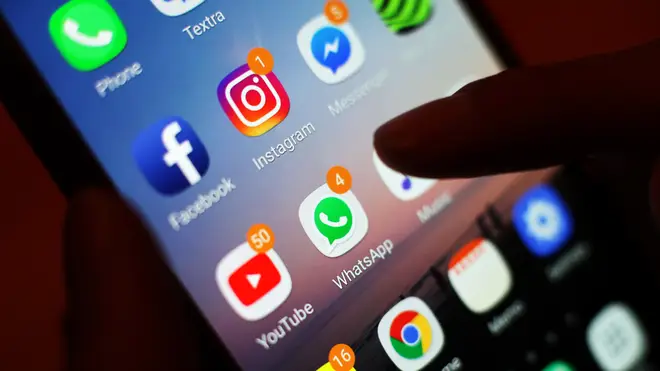
Tom Swarbrick 4pm - 6pm
27 March 2024, 00:04

More school-aged children have reported being cyberbullied compared to before the Covid-19 pandemic, a survey suggests.
Nearly one in six adolescents have experienced cyberbullying, an international study has found.
More school-aged children have reported being cyberbullied compared to before the Covid-19 pandemic, according to a report by the World Health Organisation (WHO) Regional Office for Europe.
A study, which looked at bullying among adolescents from 44 countries and regions, including England, Wales and Scotland, found 15% reported being cyberbullied at least once or twice in the past couple of months.
The Health Behaviour in School-aged Children (HBSC) survey, of more than 279,000 people aged 11, 13 and 15 years old in 2021/22, suggests the proportion of adolescents who reported being cyberbullied has increased since 2018, from 12% to 15% for boys and 13% to 16% for girls.
On average, across all the participating countries and regions in Europe, central Asia and Canada, around one in eight (12%) adolescents reported cyberbullying others at least once or twice in the past couple of months.
In England, where more than 4,200 young people were surveyed, nearly one in five (19%) reported being cyberbullied at least once or twice in the past couple of months, and 11% reported cyberbullying others.
In Scotland, where more than 4,300 young people were surveyed, 18% said they had experienced cyberbullying and 11% reported cyberbullying others.
Meanwhile, in Wales, where nearly 37,000 young people were surveyed, 17% reported experiencing cyberbullying and 9% reported cyberbullying others.
The report said there was an “urgent need” to educate young people, families and schools of the forms of cyberbullying and its implications as it is now a “dominant form of peer violence” among young people.
Dr Hans Henri P. Kluge, WHO regional director for Europe, said: “As young people’s social engagement switched to the online environment during the Covid-19 pandemic lockdowns, so it appears that perpetration and experience of cyberbullying increased.
“Focusing on virtual types of peer violence is now an urgent priority to safeguard the health and wellbeing of populations of adolescents and young people, and cyberbullying must be viewed as a major issue for societies.”
He added: “With young people spending up to six hours online every single day, even small changes in the rates of bullying and violence can have profound implications for the health and wellbeing of thousands.
“From self-harm to suicide, we have seen how cyberbullying in all its forms can devastate the lives of young people and their families.
“This is both a health and a human rights issue, and we must step up to protect our children from violence and harm, both offline and online.”
Dr Joanna Inchley, international coordinator of the HBSC study, said: “The digital world, while offering incredible opportunities for learning and connecting, also amplifies challenges like cyberbullying.
“This calls for comprehensive strategies to protect our young people’s mental and emotional wellbeing.
“It’s crucial for governments, schools, and families to collaborate on addressing online risks, ensuring adolescents have safe and supportive environments to thrive.”
Sarah Hannafin, senior policy adviser for school leaders’ union NAHT, said: “These figures showing an increase in cyberbullying among children are a real concern, and while schools work hard to help keep pupils safe, online bullying can take place anywhere, at any time.
“Schools alone cannot tackle the issue and the Government must ensure the Online Safety Act is implemented swiftly and properly enforced, while social media platforms must do much more to provide a safe online environment.
“This must include better monitoring, robust age verification, clear ways to report concerns and more transparent codes of conduct, setting out the implications of misuse.”
A Government spokesperson said: “The Online Safety Act will make the UK the safest place in the world for children to be online, requiring companies to take robust action to protect children from harmful content, illegal activity, and abuse – including keeping children safe from bullying.
“Companies that do not comply with the new can face fines of up to 10% of their global annual revenue, potentially up to billions of pounds.”